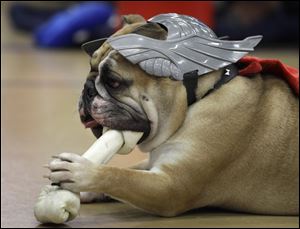
Whether pets can go vegan is a heated topic
5/1/2012
Thor Flynn Dog of Thunder, owned by Brian Flynn, of Pleasant Hill, Iowa, chews on a bone during the 33rd annual Drake Relays Beautiful Bulldog Contest in Des Moines, Iowa. The pageant kicks off the Drake Relays festivities at Drake University where a bulldog is the mascot.
NEW YORK -- When Jordan Rinke looks at his 20-month-old American Staffordshire, Pixel, there is no regret in what he has fed his pet. A vegan on and off for the past few years, Mr. Rinke says it was important to find a balance between the way he lives and how he treats his animal.
"I felt it was a bit hypocritical to be buying mostly meat-based food for my dog while claiming to a vegan," says Mr. Rinke, a virtualization engineer from San Antonio.
Talk to some veterinarians, however, and they say feeding some pets a vegan diet, devoid of any animal products, is a recipe for disaster: Most pets, after all, are meat eaters. While some owners advocate pet veganism, a number of veterinarians say it is harmful. The debate about whether a diet made solely of vegan or holistic ingredients can be harmful to a pet is a hot one. Vets do agree with the notion that neutered adult, pregnant, or lactating animals should not be limited those types of foods.
"We can argue this issue all day long," says Tony Buffington, a professor of veterinary clinical sciences at Ohio State University. "The bottom line is that if pet owners want their pets to be vegans, they do it at their animal's own peril."
The U.S. pet food industry, with $16 billion a year in revenues, recently has started selling vegetarian products in stores, receiving praise from pet owners and backlash from veterinarians who think those pet owners could be playing with fire.
Companies such as Harbingers of a New Age sell home-prepared vegan foods for cat and dogs. Harbingers spokesman James Peden says there are cases where pets have thrived using a vegan diet and that veterinarians are telling only one side of the story. "Vets take little in the way of nutrition classes to get their degree. The information that is provided in their education is usually provided by pet food companies that have a vested interest in keeping their slaughterhouse products consumed," he says.
Mr. Buffington says converting a pet into a vegetarian or feeding it holistic foods can be an ethical or moral issue, but it is mostly a philosophical argument when it comes to humans.
"Veganism is about where the foods come from," says Mr. Buffington, who has been at Ohio State for 25 years and whose son is a vegetarian. "For someone who comes to me thinking about changing their pet's diet, I would highly discourage it. Pets can't speak up and tell you that they don't want certain things."
That goes especially for cats, he says, which are carnivores and must have meats in their diets. Dogs, on the other hand, can adapt well to a plant-based diet under the right circumstances.
Kelley Kim is not concerned about harming her pet cat, Gobi: She says it was easy for her to decide what was best for her cat. While shopping at NYC Pet store in Brooklyn for specific pet foods, she looks at the vegan food selection and feels that is the best alternative.
But, she says, "Cat owners must be very wary of feeding their cats 100 percent vegan diets. I buy canned, wet cat food because it has a higher fat content and feed that to her along with the dry vegan food."
Veterinarian Katy Johnson Nelson in Alexandria, Va., says she tends to be more mainstream when it comes to what pets should be eating: the food needs to be FDA approved, safe, and have a good reputation in the animal community.
For example, Ms. Nelson thinks it is totally unnatural for a dog to be a vegetarian, but a dog can live without meat as long as it gets certain vitamins, minerals, and amino acids. "I would tell my clients to find animals the best diet they can to live the longest life possible," says
Ms. Nelson, who owns two pets and has been a veterinarian for 11 years. "The bottom line is people can feed what they want to their animals. If I was an animal I would want to eat meat."
While some owners like Mr. Rinke say they converted their pets to veganism for ethical reasons, Mr. Buffington says they should consider the ethics of making unhealthy decisions for an animal.
"Can an animal's nutrient needs be met by feeding them vegan ingredients? No one knows. Is it cheap? No. Can it be successfully done? It depends on who you talk to," Mr. Buffington says. "Because dogs and cats are captive animals, they have no choice in the matter."
The pet owners say that while they are careful about not doing harm to their pets and do as much research as they can, what they feed their pet is their decision alone.
"In the case of vets they spent years in school, so I think they are more entitled to an opinion than a random person," Mr. Rinke says. "I, however, don't agree with it."